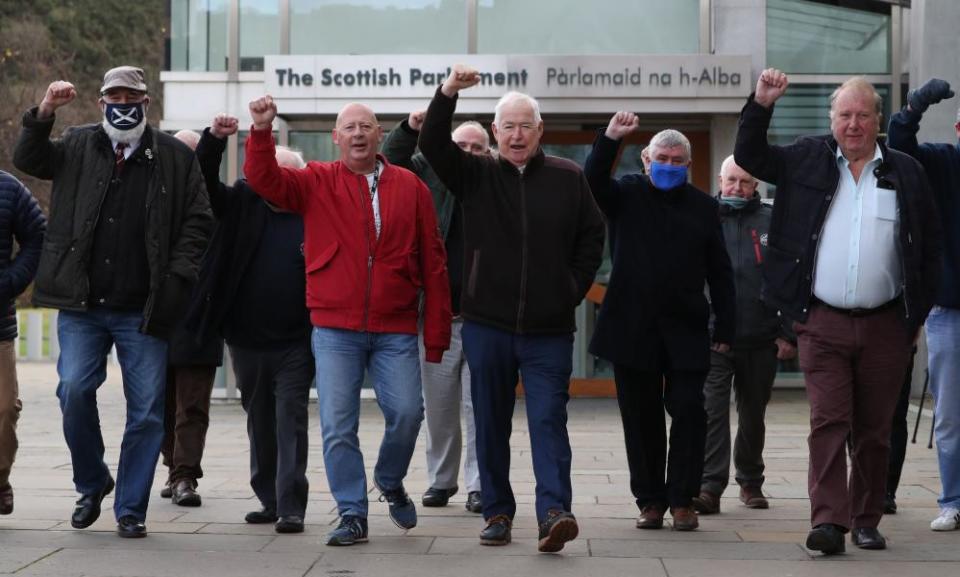Scotland to pardon hundreds convicted in 1984 miners’ strike

The Scottish government is to pardon hundreds of men convicted of offences during the 1984 miners’ strike after an independent review of the divisive and at times violent dispute.
Humza Yousaf, the Scottish justice secretary, said legislation due next year would provide the miners with a collective and posthumous pardon in an effort to provide closure to mining communities and the police officers involved.
“This was a bitter and divisive dispute,” Yousaf told the Scottish parliament. “Although three decades have passed, scars from the experiences still run deep. In some areas of the country, the sense of being hurt and being wronged remains corrosive.”
Yousaf and Neil Findlay, the Scottish Labour MSP who campaigned for the review and the pardon recommendation, said the UK government should revisit a decision in 2016 to reject calls for a UK-wide public inquiry into the policing of the strike, which lasted from March 1984 to March 1985, and particularly the so-called “Battle of Orgreave” in South Yorkshire.
Yousaf said Scottish miners were disproportionately punished. Around 500 Scottish miners were arrested and 200 of those were sacked by the National Coal Board – about 30% of the UK total, even though only 7% of the UK workforce worked at Scottish pits.
Findlay said findings from the Hillsborough inquiry and the release of UK government cabinet papers on the strike had confirmed the long-held view among miners that policing of the strike was politically motivated.
“Most of those were trumped-up charges of minor breaches of peace, and affected people who lost their jobs, they lost their redundancy, their livelihoods; many were blacklisted. Many never, ever recovered,” he said.
Yousaf said officials still needed to draft the legislation and set out the criteria to be used. He said it was unlikely there would be legislation before parliament is dissolved for next May’s Holyrood elections.
John Scott QC, a human rights specialist who led the review, recommended the that qualifying criteria should cover miners convicted of the minor common law offence of breach of the peace or breach of bail, who had no other convictions and who were fined.

Alex Bennett, 73, was among a group of miners gathered outside Holyrood before Yousaf’s statement. He said he was arrested while picketing Bilston Glen colliery in Midlothian, and summarily dismissed by the coal board, leaving his young family in poverty.
“I was blacklisted. I couldn’t get a job for three years,” he said. “I’m 74 at my next birthday and I’ve never even had a parking ticket.” Being pardoned, he said, would “right a wrong”.
Andrew “Watty” Watson, 55, a train drivers’ instructor from Fife who has campaigned for nearly 10 years to be exonerated, believes he was the youngest miner to be convicted during the strike.
A week after his 19th birthday, Watson made several V-signs at police vans taking non-striking miners to Comrie colliery in Fife. He was arrested and convicted that day of breach of the peace, and four days later the coal board sacked him. He was reinstated a year later, only weeks before an industrial tribunal was due to take place, and says he lost four years of pension contributions.
Watson said he was elated to know he may now be pardoned. “To burden me for 36 years with something as trivial as what I done? Living with it for 36 years has been hard, but I’m a fighter and I got through it,” he said.
Tom Wood, a former deputy chief constable of Lothian and Borders police who served at Bilston Glen colliery in Midlothian during the strike, said many officers were very uncomfortable about policing picket lines. Many came from mining areas, but they also felt those miners who wanted to work had the right to do so.
He said 55 officers in his force received serious injuries on picket lines, including fractures and torn ligaments. Some miners were convicted of serious charges for acts of violence. “It was no picnic,” Wood said.
Even so, he said the then government and the National Coal Board overreacted. “As regards miners who were arrested for simply breach of the peace and subsequently sacked and blackballed, that extra-judicial punishment by the coal board was spiteful and excessive.”
He added: “The real lesson of the miners’ strike is what didn’t happen afterwards: [there was no] rebuilding, retraining and no investment in mining communities to give people hope. Mining villages were literally hollowed out.
“We’re very unlikely to see another major industrial dispute like that, but in a post-Covid, post-carbon age we’re going to see further industrial decline. How we handle that post-industrial decline is going to be vitally important. That for me is the main lesson of the miners’ strike.”

 Yahoo News
Yahoo News 